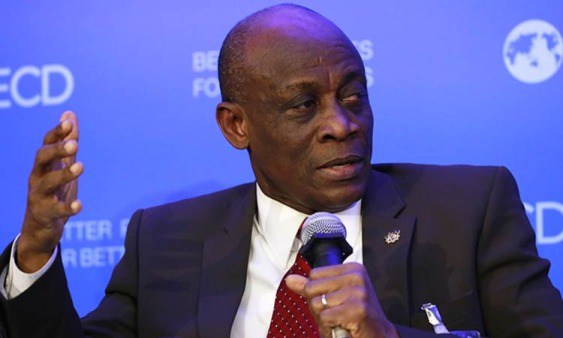Former finance minister Seth Terkper has called on government to be more candid in presenting figures in the budget which conflict with what is presented by multilateral institutions and international rating agencies, as the practice has implications for the economy on the international lending market.
His comments come on the back of macroeconomic figures presented by finance minister Ken Ofori-Atta which are quite different from figures captured in the reports of the International Monetary Fund and other international organisations.
According to the mid-year review budget, Mr. Ofori-Atta said the public debt to GDP as of the end of 2021 had hit 76.1 percent. He further stated that the fiscal deficit during the same period was 13.8 percent, including the financial sector clean-up cost.
However, the IMF Article IV Consultation released last week shows the country’s debt to GDP in 2020 was 78.9 percent, which is 2.8 percentage points higher than in the budget. The budget deficit including financial sector and energy cost, according to the IMF, also stood at 15.2 percent within the period; thereby contradicting government’s figure of 13.8 percent mentioned in the budget.
These conflicting figures, former finance minister Seth Terkper says, will create problems for the economy as international lenders will rely on data from the multilateral institutions and rating agencies, thereby increasing the cost of borrowing on the bond market.
“With respect to its impact, we are seeing it already. Despite the rosy fiscal picture given to Ghanaians, we are seeing auction shortfalls on the domestic market whereby government will have to raise interest rates (other than tap-ins with unconventional sweeteners) before Ghanaians or Ghanaian institutions will give it money because of the tightness in the budget.
“As for borrowing outside, I don’t have to repeat what the World Bank, the African Development Bank, the IMF as well as rating institutions warning to us about finding ways and means of lowering the deficit in a very credible way.
“Because the effect is that we are either going to pay a significantly high amount of interest or adopt non-transparent approaches like the zero-coupon loans or we may not be able to borrow at all, as our debt is likely to range between 85-90 percent of GDP by end 2021 as is being estimated by various organisations; and we will end up becoming distressed,” he said.
He advised that government must come clean with macroeconomic data that will be in sync with what is given to the international community and that which is presented domestically through the budget.
“Government has had representations made to several international agencies where, in some cases, it agrees to the fact that the fiscal situation is worse than what was presented in the mid-year review. These institutions include the ratings agencies – Fitch, Moody’s, and Standard and Poor’s – and most recently, the IMF in the Article IV report that shows clearly the economy is in a worse fiscal shape than was presented in the 2021 mid-year budget.
“In some cases, such as the IMF ARTICLE IV, these reports are actually executed international agreements which Ghana has signed onto and which obligation is fulfilled by every government,” he said.
The IMF projects debt to hit 83.5 percent of GDP by end of 2021, effectively putting the country on the list of highly distressed economies. The IMF is therefore advising government to up its game on fiscal consolidation efforts.
“Fiscal consolidation is needed to address debt sustainability and roll-over risks, as Ghana continues to be classified at high risk of debt distress. To protect the most vulnerable, considerations could be given to more progressive revenue measures and a faster return to the pre-pandemic level of spending, with a shift toward social, health and development spending. [IMF] directors also encouraged the timely completion of the planned audit of COVID‑19 emergency spending and new expenditure arrears,” the Article IV report stated.
That the country’s fiscal situation is deteriorating is further underscored by rating agency Fitch – which recently downgraded the economy’s outlook from stable to B negative, stating that its decision partly reflects the significant deterioration in public finances stemming from the COVID-19 pandemic and delays to government’s fiscal consolidation efforts, which reduce the country’s ability to absorb further shocks for an extended period.
Fitch projects the country’s debt to hit 81 percent of GDP by end of year.










